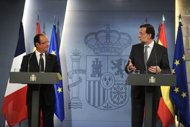France, Spain urge action to curb market rates

As President Francois Hollande flew to Madrid, bond markets sent Spain's 10-year interest rates soaring to levels that could topple the eurozone's fourth biggest economy.
France's leader backed Prime Minister Mariano Rajoy's deficit-slashing government, which is also battling to salvage its banks with a eurozone loan of up to 100 billion euros ($125 billion).
Hollande prodded European Central Bank chief Mario Draghi to act, as the central bank fine tuned plans for a mechanism to help the most fragile eurozone nations by purchasing their sovereign bonds.
European Union leaders had agreed June 29 on measures that would allow the ECB to intervene in "exceptional circumstances," the French leader said after lunching with Rajoy.
"It is up to the European Central Bank to translate that message according to its own goals," the French president said.
"I remind you that among the ECB's missions is price stability but there is also monetary policy," Hollande added.
"And when we see such large differences in interest rates with no economic justification, that could be a justification for intervention in the name of monetary policy goals."
The ECB has made clear it could help by purchasing bonds of troubled nations, but only if they apply formally for help from the eurozone's bailout funds and submit to their strict conditions.
All Europeans backed the euro, the Spanish premier said.
"But it is important we bring an end to this situation in which some countries finance themselves at zero percent and other countries finance themselves at very high prices," Rajoy said.
As he spoke, investors were demanding more than 6.6 percent interest to hold Spanish 10-year bonds and 1.315 percent for equivalent German debt.
"With this fragmentation of the market, at these prices, it is very difficult for monetary union to function as such," Rajoy said. "This is a major subject."
Spain's high borrowing costs, combined with debt repayments of about 30 billion euros due in October, have stoked expectations that Rajoy will have no choice but to seek a broad bailout.
"It is Spain's sovereign right to decide, including the how and the when," Hollande said, showing his solidarity with Spain as he also announced a France-Spain summit in Paris on October 10.
Hollande noted that the ECB was expected to give more details of the mechanism for any intervention by September 6.
Rajoy denied political considerations -- such as regional elections in the Basque Country and Galicia on October 21 -- would play any part in the timing for a possible sovereign rescue.
"Just as when we asked for help for the financial sector we did it because we thought it was good for Spain to regain credit and have economic growth and employment, when I know exactly what is on offer I will take a decision," Rajoy said.
Spain aims to find 102 billion euros in budget cuts and tax increases by 2014 so as to lower the public deficit from a blowout figure of 8.9 percent of economic output last year to 2.8 percent.
But the urgency of Spain's problems was exposed as the debt-laden Valencia region said it would ask for 4.5 billion euros from the central government, two days after Catalonia reached out for 5.0 billion euros.
In sharp contrast to the Franco-Spanish display of pro-euro solidarity, Slovakia's Prime Minister Robert Fico said the fate of the eurozone hung in the balance.
"I see a 50 percent possibility of the eurozone splitting and a 50 percent chance of its survival," Fico told journalists in Bratislava, warning the outcome would depend on how over-indebted members choose to deal with the crisis.
In addition, reaction by member states to calls for closer European integration will either lead to "strengthening of the European Union and eurozone or its split," Fico said.
What the stars mean:
★ Poor ★ ★ Promising ★★★ Good ★★★★ Very good ★★★★★ Exceptional
Related Contents
Latest News
More News
- Russian President congratulates Vietnamese Party leader during phone talks (January 25, 2026 | 09:58)
- Worldwide congratulations underscore confidence in Vietnam’s 14th Party Congress (January 23, 2026 | 09:02)
- Political parties, organisations, int’l friends send congratulations to 14th National Party Congress (January 22, 2026 | 09:33)
- 14th National Party Congress: Japanese media highlight Vietnam’s growth targets (January 21, 2026 | 09:46)
- 14th National Party Congress: Driving force for Vietnam to continue renewal, innovation, breakthroughs (January 21, 2026 | 09:42)
- Vietnam remains spiritual support for progressive forces: Colombian party leader (January 21, 2026 | 08:00)
- Int'l media provides large coverage of 14th National Party Congress's first working day (January 20, 2026 | 09:09)
- Vietnamese firms win top honours at ASEAN Digital Awards (January 16, 2026 | 16:45)
- ASEAN Digital Ministers' Meeting opens in Hanoi (January 15, 2026 | 15:33)
- ASEAN economies move up the global chip value chain (December 09, 2025 | 13:32)

 Tag:
Tag:




















 Mobile Version
Mobile Version